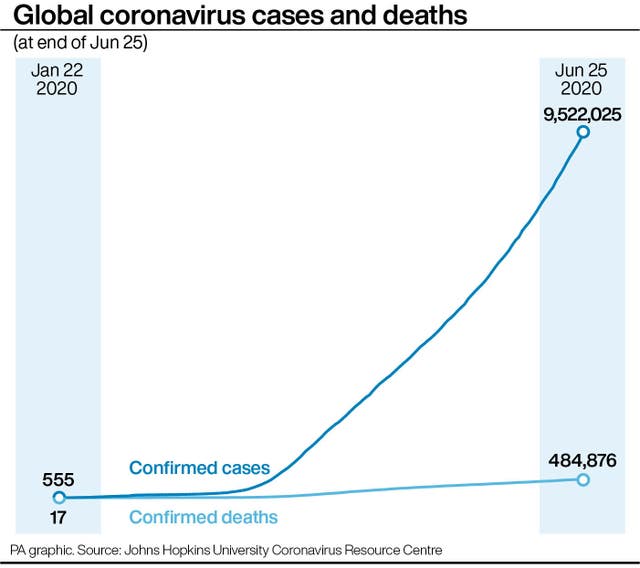
A number of countries are continuing to grapple with Covid-19 as experts suggest the US may have passed 20 million cases and China moves to contain a second outbreak.
Surging infections across southern US states have highlighted the risks of reopening economies without effective treatment or vaccines.
Officials estimate that 20 million Americans have been infected with the coronavirus since it first arrived in the United States.
The figure, from the Centres for Disease Control and Prevention (CDC), is roughly 10 times the number of confirmed cases which is 2.3 million.
Officials have long known that millions of people were infected without knowing it and that many cases are being missed because of gaps in testing.
Another record daily increase in India has pushed the country’s caseload towards half a million, while other countries with large populations like Indonesia, Pakistan and Mexico grappled with large infection numbers and strained health care systems.
 (PA Graphics)
(PA Graphics)
South Africa, which accounts for about half of the infections on the African continent with 118,375, reported a record 6,579 new cases, as transmissions increased after it loosened what had been one of the world’s strictest lockdowns earlier this month.
Mexico reported some of its highest 24-hour counts so far, with 6,104 new cases and 736 additional deaths, as its treasury secretary began isolating at home after a positive test.
In China, authorities have mobilised resources for mass testing and locked down parts of Beijing this month due to an outbreak that has infected 260 people.
The 11 new cases reported in the capital on Friday continued a downward trend that suggests transmissions have been largely brought under control.
The important role of WHO also leads countries themselves to evaluate their mode of functioning & structure, with a lot of work on transparent data accessibility & general functioning.🇫🇷 reiterates its confidence in the WHO capacity to face emerging health risks.–@olivierveran pic.twitter.com/mRsKNP4wdN
— World Health Organization (WHO) (@WHO) June 25, 2020
The United States, which counts the most infections in the world, is seeing daily jumps in Covid-19 cases nearing the peak reached during late April.
Arizona’s 3,056 additional infections reported on Thursday marked the fourth day in a week with a increase of more than 3,000.
Transmissions have spiked following Republican governor Doug Ducey’s decision to lift stay-at-home restrictions in May.
Twenty-three per cent of tests conducted in the state over the past seven days have been positive, nearly triple the national average, and a record 415 patients were on ventilators.
 A couple watches a movie from inside their car at a drive-in installed in the Palmeiras soccer stadium in Sao Paulo, Brazil (AP)
A couple watches a movie from inside their car at a drive-in installed in the Palmeiras soccer stadium in Sao Paulo, Brazil (AP)
The numbers “continue to go in the wrong direction”, said Mr Ducey, who confirmed that the state has postponed further efforts to reopen.
Reporters questioned his position on the use of masks and his attendance at US president Donald Trump’s campaign event, held indoors this week at a Phoenix church. Many of the 3,000 people who attended did not wear face coverings.
The United States reported 34,500 Covid-19 cases on Wednesday, slightly fewer than the day before, but still near the high of 36,400 reached on April 24, according to a count kept by Johns Hopkins University.
The daily average has climbed by more than 50% over the past two weeks, an Associated Press analysis found. The true numbers are probably much higher because of limited testing and other factors.
 Arizona governor Doug Ducey (AP)
Arizona governor Doug Ducey (AP)
India, which has the world’s second-largest population, has seen regular record daily increases. The 24-hour spike of 17,296 new infections reported on Friday raised the national caseload past 490,000, including 15,301 fatalities.
Indian Railways delayed the resumption of regular train services by more than a month, until August 12.
In India and in neighbouring Pakistan, government leaders have resisted new restrictions, citing economic concerns.
The world’s fourth-most populous country, Indonesia, passed 50,000 cases on Thursday, with at least 2,620 deaths, the highest number of cases and fatalities in south-east Asia. That’s up from just two positive cases in early March.
 Commuters wearing protective face masks ride a bus amid the new coronavirus pandemic in Rio de Janeiro (AP)
Commuters wearing protective face masks ride a bus amid the new coronavirus pandemic in Rio de Janeiro (AP)
The virus’ return is also erasing hard-won gains in South Korea, which reported 39 newly confirmed cases on Friday, mostly from the Seoul area which had escaped the worst of the country’s outbreak in February and March.
Australia on Friday reported 37 new cases, including 30 in Victoria state, where health authorities are scrambling to contain an outbreak.
Authorities said they tested 20,000 people in Melbourne suburbs as they went door-to-door in their attempts to stamp out the virus.
In Europe, the official in charge of Spain’s response to Covid-19 said imported infections are a growing source of concern as the continent readies to welcome more visitors.
Epidemiologist Fernando Simon said on Thursday that 54 people who had contracted the disease in the past week have been linked to recently arrived visitors in Spain.
He suggested that controls should be strict and that regional and local governments should be ready to apply localised isolation to avoid spreading the disease.
In Paris, the Eiffel Tower reopened to visitors after its longest peacetime closure of 104 days.



Why are you making commenting on The Herald only available to subscribers?
It should have been a safe space for informed debate, somewhere for readers to discuss issues around the biggest stories of the day, but all too often the below the line comments on most websites have become bogged down by off-topic discussions and abuse.
heraldscotland.com is tackling this problem by allowing only subscribers to comment.
We are doing this to improve the experience for our loyal readers and we believe it will reduce the ability of trolls and troublemakers, who occasionally find their way onto our site, to abuse our journalists and readers. We also hope it will help the comments section fulfil its promise as a part of Scotland's conversation with itself.
We are lucky at The Herald. We are read by an informed, educated readership who can add their knowledge and insights to our stories.
That is invaluable.
We are making the subscriber-only change to support our valued readers, who tell us they don't want the site cluttered up with irrelevant comments, untruths and abuse.
In the past, the journalist’s job was to collect and distribute information to the audience. Technology means that readers can shape a discussion. We look forward to hearing from you on heraldscotland.com
Comments & Moderation
Readers’ comments: You are personally liable for the content of any comments you upload to this website, so please act responsibly. We do not pre-moderate or monitor readers’ comments appearing on our websites, but we do post-moderate in response to complaints we receive or otherwise when a potential problem comes to our attention. You can make a complaint by using the ‘report this post’ link . We may then apply our discretion under the user terms to amend or delete comments.
Post moderation is undertaken full-time 9am-6pm on weekdays, and on a part-time basis outwith those hours.
Read the rules here